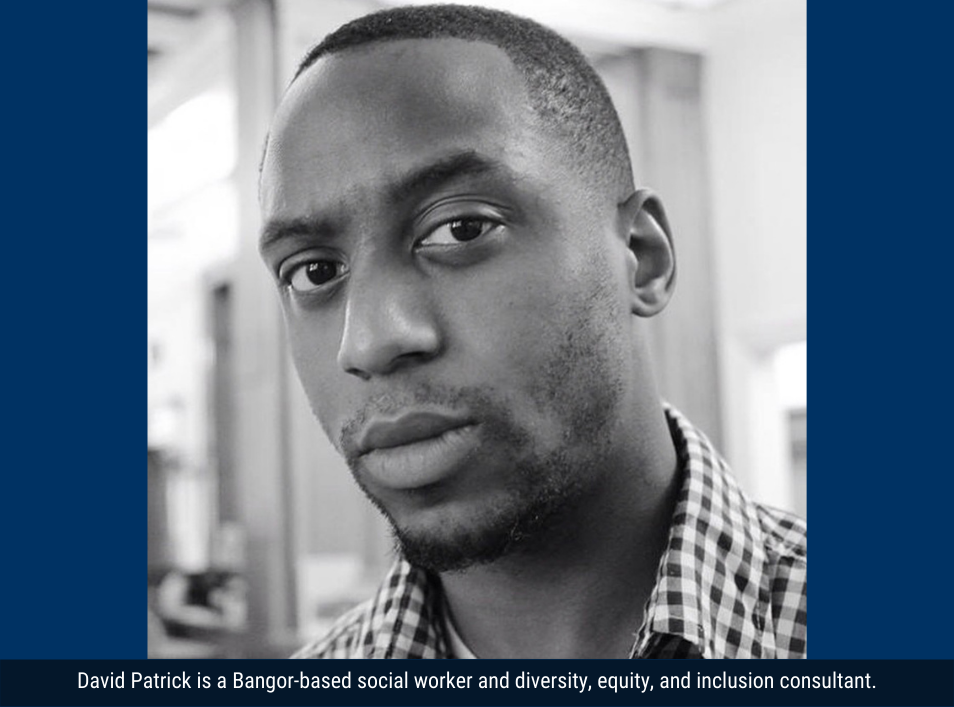Black Bear alumni, faculty, staff, and students are among Maine’s most productive innovators and entrepreneurs. In this month’s column, we hear from David Patrick ‘16, ‘19G, a Bangor-based social worker and diversity, equity, and inclusion consultant who co-founded Racial Equity and Justice (REJ) with Desiree Vargas ‘20. A BIPOC-led alliance, REJ provides both education through a consulting arm, and community support through a non-profit arm. Patrick discusses how REJ’s unique operations model was influenced in part by his innovation studies at UMaine, and how social work, innovation, and entrepreneurship touch every aspect of his professional life.
—
David Patrick: “At UMaine, I took innovation courses as electives when I was an undergraduate studying international business and marketing. I started intertwining ideas I had for projects with the curriculum and I was able to use innovation tools, like process development, in the professional spaces that I was in. I think the very first project that I did was an open-access community garden at a substance use treatment facility. It offered kind of a holistic therapeutic experience for the clients, but it was also open to the public – people could come and pick herbs and vegetables at no cost to them. The whole project was developed through the Innovation Engineering curriculum from the market test to how we would communicate the project to the community.
“I’ve used that kind of approach in establishing Racial Equity and Justice as both a consulting firm and a non-profit. We’re unique because we’re two entities and we have two primary functions. One is to educate the broader community, and the other is to support the community that you identify with. So, in one half of our work, we are educating and consulting on issues of discrimination and supporting policy change. On the other side, we are directly supporting community members with culturally aware and appropriate services and advocacy.
“Before founding REJ, we had been doing work like this peripherally, collaborating with different non-profits, doing a lot of volunteering. Instead of continuing to divide our time, we thought ‘What if we concentrated all of our most valuable community output and energy resources in one place that was owned and operated by people who looked like the people that we were trying to serve?’ You can rewrite all the policies in the world, but if the people who are impacted by those policies don’t believe that those spaces are going to be improved, then they don’t mean anything. We knew that we needed to address both sides. It couldn’t be just training, educating, and then disappearing. It had to be training, educating, and uplifting the people in those spaces.
“Innovation, for us, is process and perspective-oriented. For our consulting work, we’ve developed a curriculum based on peer-reviewed research that is accredited and state-certified for continuing education. We’re a strength-based and solution-focused organization. We talk about historical context and ask people to take accountability for the things that happen in their space, but it’s not about guilt or shame or blame. Our approach is based on accountability and solutions, and I think that’s refreshing for the groups that we work with. Recently, we worked with the City of Bangor on a policy change and then developed an advisory committee to assist with that policy change. On the community side, to give one example, we collaborated with the Peace and Justice Center of Eastern Maine to do a mobile food pantry earlier in the pandemic. Recognizing that a lot of families can’t get to a food pantry during working hours, we hired delivery drivers to do contactless delivery. Also during the pandemic, we started providing care packages to community members and pairing that with community events. So, we would get together, we would garden, we would farm, and we would put together these care packages in an attempt to build a sense of connectivity.
“We’ve always seen this unique juxtaposition of education for the community and for industries and organizations alongside support, healing, community activities, retreats, and collaboration amongst people of color. At almost every intersection of our work, there’s that dualistic focus of both sides of the equation.”
NOTE: The “Innovators of UMaine” series is supported by a grant to the Alumni Association from the Maine Technology Institute.
